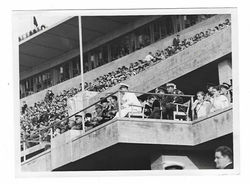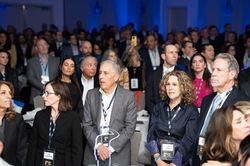Florida Telecommunications Relay, Inc: Free Specialized Telecommunications Equipment to Floridians

PROFILES By David L. Snelling
February 4, 2022
People experiencing hearing loss and difficulties communicating over the telephone can turn to a statewide non-profit organization for help.
For over 30 years, Florida Telecommunications Relay, Inc. (FTRI) has been providing free specialized telecommunications equipment to Floridians who have a hearing loss, or speech disability.
A State law known as the Telecommunications Access Systems Act (TASA) created FTRI and its specialized Equipment Distribution Program, along with the Florida Relay Service, in 1991.
TASA was implemented in response to the new federal Americans with Disabilities Act (ADA), which charged states with making their telecommunications networks accessible to people with hearing and speech disabilities.
The program offers amplification and signaling devices for people who are hard of hearing, late-deafened, deaf, Deaf/blind, or have a speech disability.
Elissa Moran, Outreach Manager for FTRI, said the organization works with manufacturers such as Clarity, Serene and ClearSounds to offer amplified telephones and phone amplifiers that are available through 19 FTRI regional distribution centers in the state of Florida. A map of RDC locations and the simple online equipment application form can be found on the FTRI website, www.ftri.org
Moran said that according to TASA, people need meet only three requirements to qualify for the program. They must be a permanent Florida resident, be at least three years old, and be certified as having a hearing loss or speech impairment.
She said state law didn't set any requirements for income and insurance to qualify for the program. The equipment is loaned to clients to keep for as long as it is needed and may be exchanged for different models as hearing loss changes over time. Customer Care technical support is available by phone, email, or in-person, also at no cost to the client.
Moran stated the distribution program offers an array of amplified telephones that meet the needs of people experiencing hearing loss and speech problems.
For example, she said the Clarity XLC8 cordless amplified telephone allows people to make calls with and without a landline connection. It can be paired with up to two Bluetooth-equipped cellphones, allowing a user to place hearing aid-compatible amplified calls using their cell phone service. In addition to a great speakerphone and distortion-free amplification, the XLC8 allows people to slow down live conversations, and the playback of messages on the built-in answering machine.
"The nice thing about this device is you can slow down live conversations, and play the messages back slowly," Moran said. "It's huge for seniors because if someone is talking so fast that they probably can't keep up. This is a great feature."
Moran said like its predecessor the XLC7BT cordless amplified telephone, the XLC8 offers up to 50 decibels of amplification along with tone control, a volume boost button, and ergonomic volume control wheel for a customized listening experience.
Moran highlighted another cool feature of the Clarity XLC phones- their DECT technology, and the available companion Clarity XLCgo. When used together, the XLCgo acts like an expanded handset, meaning it can be set up in a different room from the ‘base’ XLC8 or 7 it is paired with. It is like getting two phones, in one!
Even better, the XLCgo will, just as the name implies, amplify cell phone calls when on the go. "When someone needs to leave the house and they have a cell phone amplifier to use outside the home environment, they are not closed off from communication," she said. "They are safer, better-equipped to communicate effectively during an emergency. Additionally, the equipment is easy to use and friendly to fingers that are not as nimble as they used to be. It's designed especially for older people."
Like the Clarity products, the Serene SA-40 Amplifier offers 40 decibels of amplification and multiple tone settings. It connects easily to Bluetooth-equipped smart phones and features a powerful speakerphone.
Moran said people may visit the FTRI Regional Distribution Centers to explore phone equipment options, where they will receive personalized service from FTRI-trained staff. That specialist will assess the applicant’s ability to hear and understand speech over the phone, and match them with the right device to help improve their telephone communications experience.
"Somebody who's interested in the phones and wants to learn more about them, would schedule an appointment at one of our RDC's. There they will be greeted by someone who has received the appropriate training by FTRI staff in Tallahassee, Moran said. "They make sure that person has the right device, and the right training, and the client goes home that day with free equipment, with no hidden fees or costs."
Moran explained that FTRI doesn't provide phone services, just the phones and amplifiers. "They must have their own phone lines," Moran said. Our equipment makes those phone lines accessible to them.”
The non-profit organization doesn't take any payments for the phones distributed to citizens who need them, or engage in any fund-raisers. That’s because according to TASA, FTRI services are funded by a small surcharge assessed on each landline in the State of Florida. The current assessment is only 10 cents per month.
Moran emphasized that the FTRI program offers high-quality phones that are far superior to any devices sold in retail outlets. It is because they are so specialized, and expensive, that they are pretty much available only online, or through state programs such as FTRI. "You won't find them in your local Target or Best Buy," she said. "They are not available for purchase at any local stores."
Although the Florida Relay Service plays an important role in making telecommunications accessible by allowing standard phones (like those at the pizza place) to connect to non-standard phones (think the old TTY, and increasingly, Captioned telephones), Moran says the equipment distribution program gets the most attention of the FTRI programs because the otherwise expensive phones and equipment are free.
She said FTRI outreach and awareness programs strive to reach as many people as possible to tell them about the free phone equipment distribution program. However, with limited advertising budgets, that can be a challenge.
"People are not seeing this stuff to help improve their lives," she said. "The program can really help them if they know it exists."












































